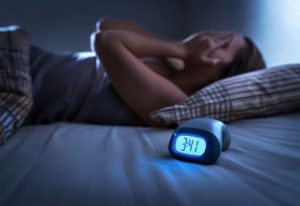Due to the nature of the job, with its inherent stress and the necessity of shift work, sleep problems among nurses were common occurrences long before COVID-19 hit the scene. Insufficient and poor-quality sleep are both linked to a higher risk of developing depression and anxiety. As the COVID-19 pandemic developed, nurses were working under a much greater stress level and, according to a NYU Rory Meyers College of Nursing led study, experienced higher rates of sleep problems that contributed to increased anxiety and depression rates.
Common Sleep Problems Among Nurses
 According to the results of a survey study that was presented at 33rd annual meeting of the Associated Professional Sleep Societies LLC (APSS), sleep problems are more common among nurses than they are in the general population. The researchers found that 49 percent of the nurses participating in the study got, on average, less than seven hours of sleep per night, with just 28 percent of adults in the general population getting that amount of sleep.
According to the results of a survey study that was presented at 33rd annual meeting of the Associated Professional Sleep Societies LLC (APSS), sleep problems are more common among nurses than they are in the general population. The researchers found that 49 percent of the nurses participating in the study got, on average, less than seven hours of sleep per night, with just 28 percent of adults in the general population getting that amount of sleep.
Researchers also found that 31 percent of the nurses suffered from chronic insomnia and shift work sleep disorder (SWSD), 18.5 percent had a medium-to-high risk of developing obstructive sleep apnea, 14 percent said they suffered from restless leg syndrome and 4.5 percent experienced excessive sleepiness during the day.
Over the past decade, the body of evidence linking irregular, insufficient and poor-quality sleep to increased anxiety and depression risks has steadily grown. While the bidirectional relationship between sleep and mental health has been established – meaning sleep impacts mental health and mental health impacts sleep – there is also evidence that insufficient or poor sleep can play a role in actually causing anxiety and depression.
The Impact of the Pandemic
For the nurses that served as front line workers in the face of the Covid-19 pandemic, an already physically and mentally stressful job had a great deal more stress added to it. In the early days of the pandemic, there were a lot of unknowns at play as medical science scrambled to find effective treatments and solutions.
There were widespread shortages of personal protection equipment (PPE) and major changes to medical institutional settings and procedures. For example, patients died alone with families not allowed to be with their loved ones during their last hours. The staff shortages that have been plaguing the profession for years increased as the pandemic took hold, pushing nurses into longer, more difficult hours. All of these things and more added to the daily stress nurses endure.
The pandemic also impacted the prevalence of sleep problems in nurses, leading to a significant increase, according to NYU Rory Meyers College of Nursing researchers. And, because sleep and mental health are so deeply connected, that increase in sleep problems was accompanied by a corresponding increase in anxiety and depression. The NYU Rory Meyers College of Nursing led study revealed that during the first six months of the pandemic, 55 percent experienced insomnia, 52 percent dealt with anxiety and 22 percent suffered from depression, rates that were significantly higher than generally found by other studies prior to the pandemic. The researchers found that sleeping less than five hours before starting a shift resulted in an even higher risk of anxiety and depression.
Interestingly, a study in Poland of nurses and midwives during the pandemic found similar results. Their study also revealed a significantly higher rate of sleep problems and disorders among medical professionals during the pandemic, particularly among those dealing with potential COVID-19 exposure via their patients.
Nurses Need Sleep: Potential Solutions
In both the American and Polish study, researchers pointed to the importance of actively addressing sleep problems among medical professionals. This isn’t a new issue, but the pandemic helped to highlight its importance. A 2018 article published in the Journal of Nursing Management noted that solutions to sleep problems in the medical professions fall into two categories: those implemented by the individual and those that management can – and should – set into place.
Management solutions include becoming more aware of and acting upon the sleep health of nurses via such policies as implementing 15-to-30 minute nap breaks, a more flexible type of rotating scheduling and increasing social or work culture and management support for better sleep habits. Nurses shouldn’t be pressured to work schedules that interfere with getting proper sleep, such as back-to-back double shifts for days on end, outside of extreme emergency situations. When such scheduling situations do occur, management should work to provide proper time off scheduling for recovery.

Proper sleep is essential to the health, well-being and performance of nurses. We all benefit from health care management policies that encourage better sleep health among nurses.







